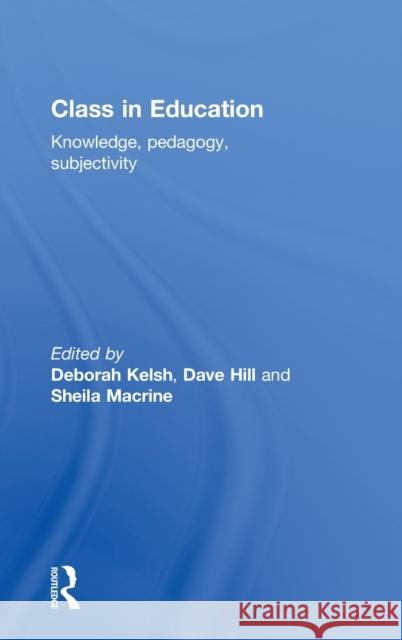Class in Education: Knowledge, Pedagogy, Subjectivity » książka
Class in Education: Knowledge, Pedagogy, Subjectivity
ISBN-13: 9780415450270 / Angielski / Twarda / 2009 / 224 str.
Class in Education: Knowledge, Pedagogy, Subjectivity
ISBN-13: 9780415450270 / Angielski / Twarda / 2009 / 224 str.
(netto: 699,68 VAT: 5%)
Najniższa cena z 30 dni: 705,23
ok. 22 dni roboczych.
Darmowa dostawa!
Across a range of issues, the essays in this text argue for and demonstrate that a materialist understanding of class has the explanatory power to analyze the structure of owning and power in social relations, and therefore to point to ways to abolish exploitation of human beings and restructure society in a more egalitarian way.
Access to economic resources is becoming the defining issue of the twenty-first century. Inequity is stark and pervasive. Consequently, from the daily papers to the academic presses, the once marginalized concept of "class" is gaining widespread attention. Class in Education argues that the "class" of much contemporary social and educational theory does not go far enough in its analyses. The authors suggest that, as a result, it cannot enable the production of knowledges, pedagogies, and subjectivities needed to change inequitable access to economic resources and the many socio-cultural inequities that this fosters.
In many contemporary articulations the term "class" shies away from explaining that it is the production relations of capitalism that causes economic inequity and therefore must be changed. Instead, it embraces description of the various cultural attributes of groups and individuals, often in order to "update" them and thereby enhance the individual’s capacity to compete for limited economic resources. Class in Education intervenes in this trend, which quietly sustains and extends the tenets of neoliberalism into the daily lives of teachers and students, chief among which is the premise that a society based on competition among individuals is not only singularly necessary but also pre-eminently natural. This volume of essays argues for the necessity and effectiveness of a materialist rather than a culturalist understanding of class.
Across a range of issues – among them racism, educational policy, the social studies curriculum, reading practices – the essays in Class in Education argue for and demonstrate in their arguments that a materialist understanding of class has the explanatory power to analyze the structure of owning and power in social relations, and therefore to point to ways to abolish exploitation of companion beings and restructure society in a more egalitarian way.











